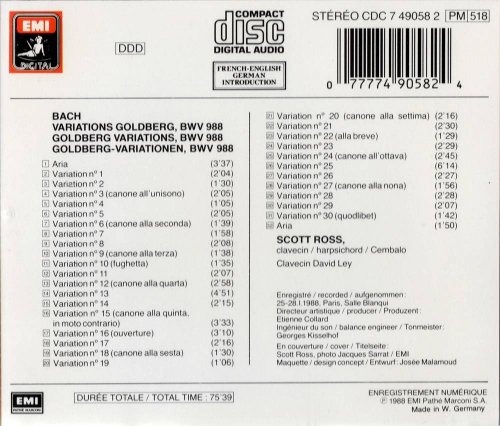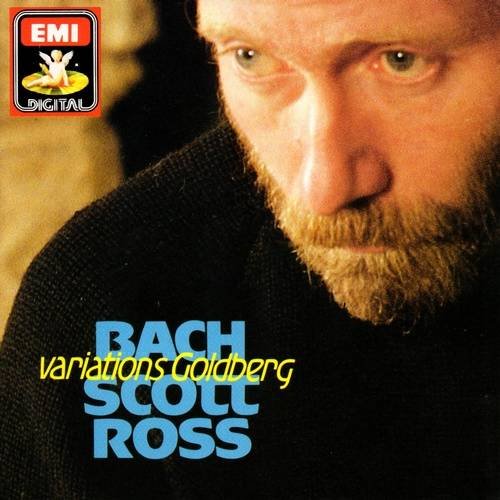
Scott Ross - J.S. Bach: Goldberg Variations (1988) CD-Rip
BAND/ARTIST: Scott Ross
- Title: J.S. Bach: Goldberg Variations
- Year Of Release: 1988
- Label: EMI
- Genre: Classical
- Quality: FLAC (image+.cue,log,scans)
- Total Time: 75:39
- Total Size: 540 Mb
- WebSite: Album Preview
Tracklist:
Goldberg Variations BWV 988
01 Aria 3:38
02 Variation 1. A 1 Clav. 2:04
03 Variation 2. A 1 Clav. 1:30
04 Variation 3. A 1 Clav. Canone All'Unisono 2:05
05 Variation 4. A 1 Clav. 1:05
06 Variation 5. A 1 Ovvero 2 Clav. 2:05
07 Variation 6. A 1 Clav. Canone Alla Seconda 1:39
08 Variation 6. A 1 Clav. Al Tempo Di Giga 1:58
09 Variation 8. A 2 Clav. 2:08
10 Variation 9. A 1 Clav. Canone Alla Terza 1:38
11 Variation 10. A 1 Clav. Fugetta 1:35
12 Variation 11. A 2 Clav. 2:07
13 Variation 12. A 1 Clav. Canone Alla Quarta 2:58
14 Variation 13. A 2 Clav. 4:51
15 Variation 14. A 2 Clav. 2:15
16 Variation 15. A 1 Clav. Canone Alla Quinta, In Moto Contrario 3:33
17 Variation 16. A 1 Clav. Ouverture. 3:10
18 Variation 17. A 2 Clav. 2:16
19 Variation 18. A 1 Clav. Canone Alla Sexta 1:30
20 Variation 19. A 1 Clav. 1:06
21 Variation 20. A 2 Clav. 2:16
22 Variation 21. A 1 Clav. Canone Alla Settima 2:30
23 Variation 22. A 1 Clav. Alla Breve 1:29
24 Variation 23. A 2 Clav. 2:29
25 Variation 24. A 1 Clav. Canone All'Ottava 2:45
26 Variation 25. A 2 Clav. Adagio 6:14
27 Variation 26. A 2 Clav. 2:27
28 Variation 27. A 2 Clav. Canone Alla Nona 1:56
29 Variation 28. A 2 Clav. 2:28
30 Variation 29. A 1 Ovvero 2 Clav. 2:07
31 Variation 30. A 1 Clav. Quodlibet 1:42
32 Aria 1:52
Performers:
Scott Ross, harpsichord

Goldberg Variations BWV 988
01 Aria 3:38
02 Variation 1. A 1 Clav. 2:04
03 Variation 2. A 1 Clav. 1:30
04 Variation 3. A 1 Clav. Canone All'Unisono 2:05
05 Variation 4. A 1 Clav. 1:05
06 Variation 5. A 1 Ovvero 2 Clav. 2:05
07 Variation 6. A 1 Clav. Canone Alla Seconda 1:39
08 Variation 6. A 1 Clav. Al Tempo Di Giga 1:58
09 Variation 8. A 2 Clav. 2:08
10 Variation 9. A 1 Clav. Canone Alla Terza 1:38
11 Variation 10. A 1 Clav. Fugetta 1:35
12 Variation 11. A 2 Clav. 2:07
13 Variation 12. A 1 Clav. Canone Alla Quarta 2:58
14 Variation 13. A 2 Clav. 4:51
15 Variation 14. A 2 Clav. 2:15
16 Variation 15. A 1 Clav. Canone Alla Quinta, In Moto Contrario 3:33
17 Variation 16. A 1 Clav. Ouverture. 3:10
18 Variation 17. A 2 Clav. 2:16
19 Variation 18. A 1 Clav. Canone Alla Sexta 1:30
20 Variation 19. A 1 Clav. 1:06
21 Variation 20. A 2 Clav. 2:16
22 Variation 21. A 1 Clav. Canone Alla Settima 2:30
23 Variation 22. A 1 Clav. Alla Breve 1:29
24 Variation 23. A 2 Clav. 2:29
25 Variation 24. A 1 Clav. Canone All'Ottava 2:45
26 Variation 25. A 2 Clav. Adagio 6:14
27 Variation 26. A 2 Clav. 2:27
28 Variation 27. A 2 Clav. Canone Alla Nona 1:56
29 Variation 28. A 2 Clav. 2:28
30 Variation 29. A 1 Ovvero 2 Clav. 2:07
31 Variation 30. A 1 Clav. Quodlibet 1:42
32 Aria 1:52
Performers:
Scott Ross, harpsichord
Scott Ross was an American harpsichordist who was both popular and renowned for his brilliant technique and insightful interpretations. He recorded the complete works of Scarlatti, Rameau, and Couperin, three composers, along with J.S. Bach, whose music he became identified with over his brief career. Ross was also a highly respected harpsichord teacher in Canada and France.
Ross's father died in 1956, about the time young Scott began showing strong interest in music. The following year, he began studies on organ and piano. In 1964, at age 13, he moved to France with his mother and brother (who together would later move back to the U.S.) and the next year enrolled at the Nice Conservatory, where he studied under Huguette Grémy-Chauliac (harpsichord) and René Saorgin (organ). He left in 1968, receiving first prize at his graduation recital. While his studies had included organ, the instrument he strongly favored in his early years in France, he began focusing on the harpsichord toward the later 1960s. He failed to win the international harpsichord competition in Bruges in 1969, but re-entered two years later and was awarded first prize. That year, he finished studies at the Paris Conservatory, where he had been receiving instruction in harpsichord since 1969 from Robert Veyron-Lacroix. In 1970, Ross' mother committed suicide, dealing a harsh blow to the young artist. He rebounded from this "foul" time (as he would refer to this period in an interview in the French magazine Diapason) with his first recording, made in 1971 by the early music label Editions STIL. The album contained works by Bach and was appropriately entitled Monsieur Bach. Ross also took classes that year at the Royal Conservatory of Antwerp from Kenneth Gilbert. Two years later, he joined the faculty at the Laval University School of Music in Quebec, becoming assistant professor there in 1978. In 1975, Ross' recording of Rameau's Pièces de clavecin was issued to generally positive notices and even received a grand prix du disque award the following year. His next major recording was the complete Pièces de clavecin by Couperin, for which he again received high praise. In 1983, he requested a leave of absence from his teaching post in Quebec. The following year, he signed a five-year contract with the French label Erato. His first project for the company was the most ambitious of his career, the 555 sonatas of Domenico Scarlatti. He began the venture in June 1984 and finished it in September 1985, a 15-month span during which he recorded two sonatas each day he entered the studio. The entire set was packaged on 34 compact discs. While Ross' reputation rests on many concert appearances and his other recordings, this massive effort was probably his greatest legacy. In 1986, several more recordings by Ross were issued containing works by Bach, Soler, and Forqueray. That same year, he resigned from Laval University. Ross' health began to seriously decline in 1988 with the first of several visits to Lapeyronie Hospital in Montpellier. He died in Assas, at the age of 38.
Ross's father died in 1956, about the time young Scott began showing strong interest in music. The following year, he began studies on organ and piano. In 1964, at age 13, he moved to France with his mother and brother (who together would later move back to the U.S.) and the next year enrolled at the Nice Conservatory, where he studied under Huguette Grémy-Chauliac (harpsichord) and René Saorgin (organ). He left in 1968, receiving first prize at his graduation recital. While his studies had included organ, the instrument he strongly favored in his early years in France, he began focusing on the harpsichord toward the later 1960s. He failed to win the international harpsichord competition in Bruges in 1969, but re-entered two years later and was awarded first prize. That year, he finished studies at the Paris Conservatory, where he had been receiving instruction in harpsichord since 1969 from Robert Veyron-Lacroix. In 1970, Ross' mother committed suicide, dealing a harsh blow to the young artist. He rebounded from this "foul" time (as he would refer to this period in an interview in the French magazine Diapason) with his first recording, made in 1971 by the early music label Editions STIL. The album contained works by Bach and was appropriately entitled Monsieur Bach. Ross also took classes that year at the Royal Conservatory of Antwerp from Kenneth Gilbert. Two years later, he joined the faculty at the Laval University School of Music in Quebec, becoming assistant professor there in 1978. In 1975, Ross' recording of Rameau's Pièces de clavecin was issued to generally positive notices and even received a grand prix du disque award the following year. His next major recording was the complete Pièces de clavecin by Couperin, for which he again received high praise. In 1983, he requested a leave of absence from his teaching post in Quebec. The following year, he signed a five-year contract with the French label Erato. His first project for the company was the most ambitious of his career, the 555 sonatas of Domenico Scarlatti. He began the venture in June 1984 and finished it in September 1985, a 15-month span during which he recorded two sonatas each day he entered the studio. The entire set was packaged on 34 compact discs. While Ross' reputation rests on many concert appearances and his other recordings, this massive effort was probably his greatest legacy. In 1986, several more recordings by Ross were issued containing works by Bach, Soler, and Forqueray. That same year, he resigned from Laval University. Ross' health began to seriously decline in 1988 with the first of several visits to Lapeyronie Hospital in Montpellier. He died in Assas, at the age of 38.

Classical | FLAC / APE | CD-Rip
As a ISRA.CLOUD's PREMIUM member you will have the following benefits:
- Unlimited high speed downloads
- Download directly without waiting time
- Unlimited parallel downloads
- Support for download accelerators
- No advertising
- Resume broken downloads


